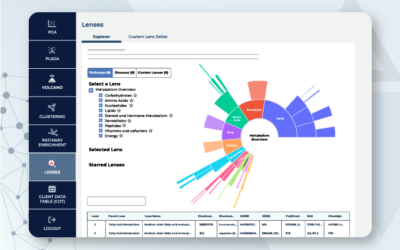Metabolomics is the study of small molecules involved in metabolism. Metabolomics can be used during the preclinical stage of drug development to identify potential drug candidates, predict adverse effects, and better understand a particular drug’s mechanism of action (MOA). By analyzing the metabolic changes that occur in response to drugs, researchers can gain valuable insights into better drug discovery and development.1 Metabolomics provides a functional readout of all upstream biological processes and environmental factors, increasing confidence in your decisions and the success rate of drug development.
Metabolomics for Cancer
In recent years, metabolomics has also been applied to search for better cancer treatments. Cancer is a complex disease characterized by abnormal cell proliferation, and it is often challenging to treat effectively due to the various molecular changes that occur in cancer cells.2 By analyzing the metabolic changes in cancer cells, researchers can gain insights into the metabolic pathways that cancer alters and identify potential drug targets.3 For example, a recent study used metabolomics to identify novel therapeutic targets for pancreatic cancer, one of the most deadly and difficult-to-treat forms of cancer.4 By analyzing the metabolic profiles of pancreatic cancer cells and healthy cells, researchers were able to identify several metabolic pathways that were altered in cancer cells and that could potentially be targeted with drugs.4 These findings provide a promising starting point for developing new pancreatic cancer treatments.
Metabolomics for Clinical Trials
Clinical trials are necessary for new drug development and regulatory approval, but a large proportion of clinical trials fail. These failures raise the overall cost of executing clinical trials and delay the arrival of drugs to the market, which means patients must wait longer for the drugs they need and pay more for them when they can finally get them. Metabolomics can help maximize the chances of clinical trial success. For instance, metabolomics is being applied in clinical trials to help personalize cancer treatment. By analyzing the metabolic profiles of cancer patients, researchers can identify differences that may predict how well a particular drug will work for a given individual and consequently help identify drug responders versus non-responders in clinical trials.1 This information can be used to tailor treatment plans to each patient’s specific needs, potentially improving the chances of success and reducing the risk of adverse effects.2
Metabolomics Can Identify New Drug Targets and Optimize Treatment: Busulfan Example
Metabolomics is enabling the next wave of new, innovative therapeutics. Scientists are increasingly using metabolomics to better inform and facilitate critical decision-making across the various phases of the drug discovery and development process. By unraveling complex interactions between biological processes and the environment, metabolomics is improving clinical trial design and efficacy to bring more life-saving drugs to the market faster. Better insights mean fewer failures. In 2022, the Metabolon Global Discovery Panel was used to develop a more efficient method of estimating busulfan clearance.5 Busulfan is a chemotherapy drug used to treat certain types of cancer and is also used as part of a conditioning regimen before a bone marrow transplant. The researchers found that plasma obtained two weeks before administering busulfan could be analyzed, and 13 endogenous metabolomic compounds could accurately predict the clearance of intravenous busulfan, particularly in patients with slow clearance. These results demonstrate that metabolomics can be used to guide busulfan dosage and to make sure that each patient is receiving the appropriate amount of the drug. The study shows that metabolomics can be leveraged to identify new biomarkers, which can help optimize treatment. With Metabolon’s targeted and custom panels, you’ll also gain unprecedented metabolomic insights into the impact and MOA of your drug. These insights could be exploited to develop a clinical trial protocol designed to maximize the chances of success.
References
- Drug Discovery News. (2022). Metabolomics: Open a window into better cancer treatments. Retrieved from https://www.drugdiscoverynews.com/metabolomics-open-a-window-into-better-cancer-treatments-15467
- Science Daily. (2022). Personalized cancer treatment: Metabolomics offers new possibilities. Retrieved from https://www.sciencedaily.com/releases/2022/10/221013194120.htm
- Zhang C, Shang X, Wang H. Untargeted metabolomics and lipidomics identified four subtypes of small cell lung cancer. Metabolomics. Dec 27 2022;19(1):3. doi:10.1007/s11306-022-01964-x
- Makunga N, Kai G, Sieniawska E. Editorial: Metabolomics as a tool in ethnobotany-driven drug discoveries. Front Pharmacol. 2022;13:1066875. doi:10.3389/fphar.2022.1066875
- McCune JS, Navarro SL, Baker KS, et al. Prediction of Busulfan Clearance by Predose Plasma Metabolomic Profiling. Clin Pharmacol Ther. Feb 2023;113(2):370-379. doi:10.1002/cpt.2794






